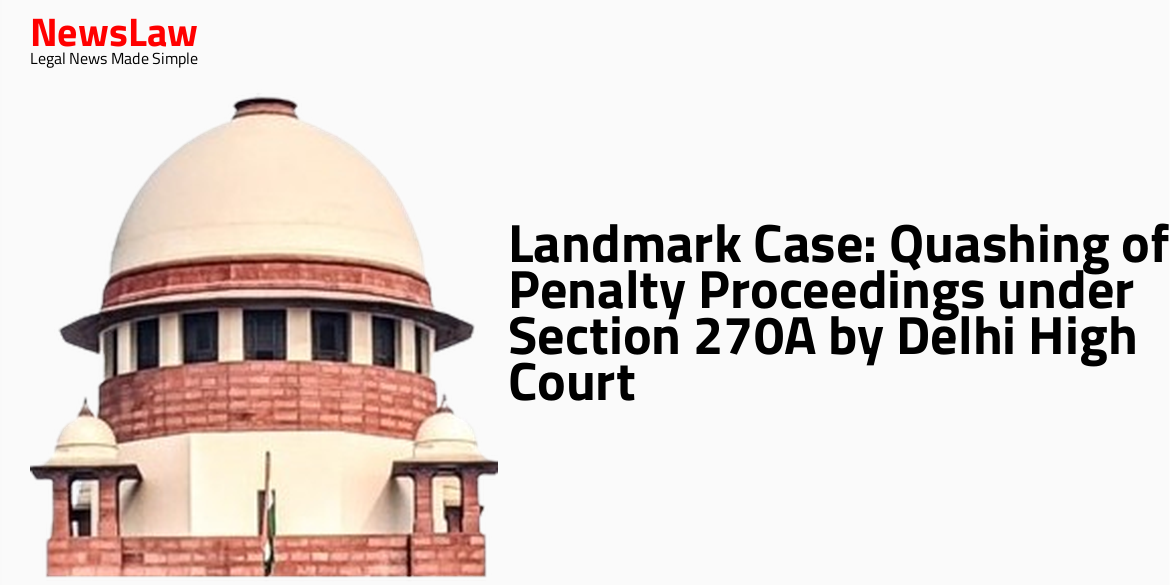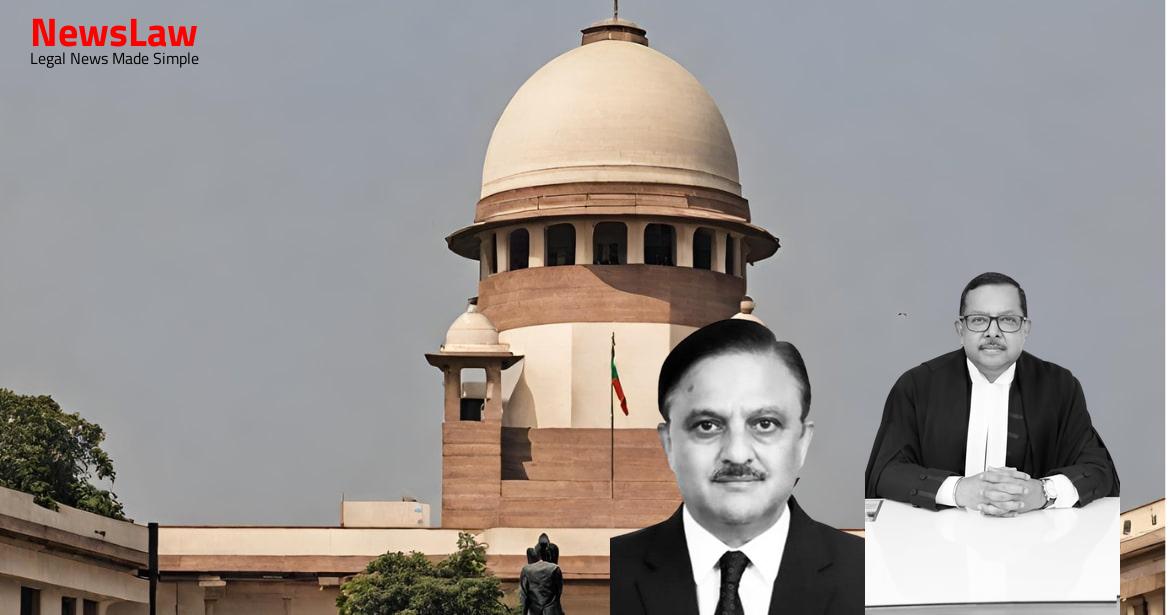In a landmark decision, the Delhi High Court recently ruled on a case regarding penalty proceedings under Section 270A. The judgment carries weight in legal circles for its implications on administrative actions and judicial review. Stay informed about this crucial ruling and its ramifications.
Arguments
- Mr. Jolly, the counsel for the petitioner, argued that the initiation of action under Section 270A should be quashed due to various grounds.
- He highlighted that Section 271(1)(c) outlines penalties for different situations but misrepresentation or suppression claims do not apply in the case due to the petitioner’s stance on income from software sales.
- The distinction between under-reporting and misreporting was emphasized by Mr. Jolly in relation to Section 270A and 271(1)(c).
- The nature of payments for software sale and distribution was discussed, pointing out that they include more than just the software or CD itself, as clarified by the counsel.
- The rejection of immunity applications by the authorities was deemed arbitrary by Mr. Jolly, especially when the petitioner had met all conditions under Section 270AA(1) of the Act.
- Mr. Jolly questioned the legality of rejecting immunity applications when penalty outcomes were uncertain, stressing the need for independent consideration.
- There was an argument made regarding the payment for software being classified as royalty under the India-USA Double Taxation Avoidance Agreement (DTAA) and Section 9(1)(vi) of the Act.
- The petitioner’s compliance with conditions set by Section 270AA(1) was highlighted as grounds for processing immunity applications per Section 270AA(3) by Mr. Jolly.
- The respondent’s misinterpretation of Section 270A(9), leading to penalties without conclusive findings, was contested by the counsel.
- Mr. Jolly reiterated the Supreme Court’s stance in Engineering Analysis and other cases regarding misreporting allegations and penalty proceedings.
- The issue of initiating penalties under Section 270A without specifying the alleged breach was criticized by Mr. Jolly as illegal.
- The importance of fulfilling conditions for maintaining immunity applications under Section 270AA was emphasized by the counsel.
- Judgments such as Minu Bakshi and Schneider Electric South East Asia were referred to by Mr. Jolly to support his arguments against the respondent’s actions.
- The absence of determinative findings on misreporting in assessment orders was pointed out by Mr. Jolly to challenge the legality of penalty proceedings.
- Mr. Rai submitted that assessment orders clearly identified the case as that of misreporting.
- Mr. Rai argued that the case falls within the exclusionary provisions of sub-section (3) of Section 270AA.
- Reference was made to the Division Bench’s observations in Minu Bakshi regarding establishing assets related to income, penalty specifications, and clarity of charges.
- The principle of being apprised of charges with clarity was emphasized based on the Schneider Electric case.
- It was argued that the petitioner had been duly notified of the charges against them.
Analysis
- The Assessing Officer or higher authorities can direct a person who has under-reported income to pay a penalty in addition to tax.
- An application for immunity from penalty must be made in the prescribed form and verified manner.
- Immunity from penalty and other proceedings can be granted if conditions are fulfilled and proceedings for penalty have not been initiated.
- Misreporting of income includes misrepresentation, failure to record investments, unsubstantiated claims, false entries, failure to report transactions, etc.
- Different calculations for tax payable on under-reported income based on various scenarios.
- No penalty if addition or disallowance of amount has already formed the basis for penalty in another assessment year.
- Penalty amount equal to fifty per cent of tax payable on under-reported income, unless due to misreporting.
- Penalty doubles to two hundred per cent if under-reported income is due to misreporting.
- Conditions where under-reported income is not considered for penalty.
- Provisions for under-reported income from previous years and special cases like deemed total income.
- Criteria for considering income as under-reported, including initial assessment, reassessment, and effects on loss.
- Calculation of under-reported income in different scenarios.
- Application process for immunity from penalty and initiation of proceedings if specific conditions are met.
- The SCNs’ which were issued for commencement of action under Section 270A were vague and unclear, lacking specificity on the nature of charges against the petitioner.
- The AO failed to base the penalty initiation on a specific violation under Section 270A (9), leading to the rejection of the immunity application.
- The initiation of penalty proceedings under Section 270A was not substantiated by a clear finding of misreporting or under-reporting of income.
- The SCNs’ did not specify the limb of Section 270A which was being invoked, rendering them unsustainable.
- The AO’s reliance on a judgment from the Karnataka High Court, instead of a binding judgment from the jurisdictional High Court, was unfounded.
- The petitioner’s stand on the taxability of income was based on a legal understanding prevailing at the time, and not without merit.
- The failure to indicate the specific charge being levied against the petitioner in the SCNs’ illustrates a lack of clarity in the proceedings.
- The AO’s failure to indicate a violation of sub-section (9) of Section 270A resulted in the premature initiation of penalty proceedings.
- In the absence of a specified transgression falling under Section 270A (9), the commencement of penalty proceedings was deemed mechanistic.
- Notice must specify the particular grounds for the action proposed to be taken.
- The notice should detail the alleged breaches and defaults committed by the noticee.
- The nature of action proposed for the breach should also be stated in the notice.
- This enables the noticee to refute the allegations and contest the proposed action.
- Blacklisting requires a clear statement of grounds and proposed action due to its severe nature.
- First principle of civilised jurisprudence is to provide a reasonable opportunity for the affected party to defend themselves.
- Notice of the case against the affected party is essential before adjudication.
- Requisites of a valid show-cause notice include specific and unambiguous mention of grounds and proposed action.
- Case laws such as CIT vs M Tech India Pvt Ltd and DIT vs Infrasoft Ltd provide insight into different contexts of show-cause notices.
- The petitioner had met the statutory pre-conditions as per Section 270AA(1).
- Immunity application rejection required firm conclusion on misreporting, which was not done by the respondent.
- The AO failed to consider the Supreme Court judgment in Engineering Analysis.
- The impugned orders were deemed unsustainable based on the overall evaluation.
Decision
- The SCNs’ have been quashed, so there is no basis for pursuing or reconsidering the immunity applications.
- Consequential reliefs are granted to the petitioner.
- The writ petitions are allowed, and the impugned orders from December 28, 2021, and January 24, 2022, rejecting the application under Section 270AA of the Act are quashed.
- A writ is issued quashing the SCNs’ dated November 16, 2021, as they would not stand in light of the judgment in Schneider Electric.
Case Title: GE CAPITAL US HOLDINGS INC Vs. DY COMMISSIONER OF INCOME TAX (INTERNATIONAL TAXATION ) CIRCLE 1(3) (1), NEW DELHI AND ORS (2024:DHC:4535-DB)
Case Number: W.P.(C)-1646/2022



